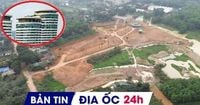On April 23, 2025, the Ho Chi Minh City Real Estate Association (HoREA) made a significant proposal urging the local government to lift the ban on short-term apartment rentals. This recommendation comes in light of the association's belief that such rentals are a legitimate business operation that should be regulated rather than outright prohibited.
Previously, on February 27, 2025, Ho Chi Minh City had implemented a regulation restricting short-term stays to mixed-use apartments or those specifically licensed for tourism services. However, HoREA argues that this regulation does not align with the 2023 Housing Law and has created inconsistencies, particularly as other localities do not impose similar restrictions.
HoREA Chairman Lê Hoàng Châu emphasized the importance of recognizing short-term rentals as a conditional real estate business. He pointed out that property owners engaging in this practice are required to register their business and pay taxes accordingly. The association noted that the blanket ban has adversely affected thousands of homeowners and workers reliant on this sector.
Current estimates suggest that there are approximately 8,740 apartments in Ho Chi Minh City available for short-term rental through platforms like Airbnb, providing jobs for between 8,000 to 17,000 individuals. The abrupt prohibition has forced many landlords to breach contracts and transition to long-term rentals, which has proven challenging due to a lack of demand.
In addition to the economic implications, HoREA warned that the ban could diminish the city’s appeal as a tourist destination compared to other regions. The association is advocating for a clear legal framework that would recognize and regulate the Airbnb model as a legitimate industry, ensuring proper registration and tax compliance.
In other developments, Vinaconex officially commenced construction on the Capital One project on April 22, 2025. This ambitious venture encompasses a complex of commercial centers, offices, service apartments, and a hotel, with a total investment of approximately 3,900 billion VND.
The Capital One project is strategically located in the Kim Văn - Kim Lũ urban area of Hanoi, featuring easy access to major transportation routes such as Ring Road 2 and the Pháp Vân - Cầu Giẽ expressway. The project spans over 11,700 square meters, with a construction density of only 40%. It includes four basements and two 30-story towers.
In terms of facilities, Tower A will house a commercial center covering 31,000 square meters and Class A office space of nearly 52,500 square meters, while Tower B will be a five-star hotel with over 400 rooms. This development is expected to become a landmark in the southern gateway of the capital, contributing significantly to the local economy and social development.
Vinaconex has set ambitious targets for 2025, aiming for consolidated revenues of 15,000 billion VND, an after-tax profit of 1,200 billion VND, and a maintained dividend of 16%. The real estate sector remains a core focus for the company, contributing 70-75% of its total profits. Alongside Capital One, Vinaconex is also engaged in several other key projects, including the Hòa Bình Boulevard in Móng Cái and the Amatina project in Hải Phòng.
Meanwhile, on April 22, 2025, the Chairman of the Hanoi People’s Committee, Trần Sỹ Thanh, signed a directive aimed at intensifying land management and addressing land encroachment issues during the reorganization of administrative units. This directive responds to recent incidents where individuals and organizations have exploited transitional periods to illegally occupy public land and construct unauthorized buildings.
Such actions not only undermine state management effectiveness but also pose risks of complex disputes and threaten public security and citizen trust. The directive holds local leaders accountable for land management and construction order, urging them to prevent any lax oversight.
The directive also mandates increased public awareness campaigns to encourage compliance with legal regulations and calls for strict penalties against violations from the outset. The Department of Agriculture and Rural Development is tasked with reviewing and documenting land conditions in areas at risk of encroachment, while the Department of Construction is directed to coordinate with inspection forces to deal with unauthorized constructions.
In a related effort, the Bắc Ninh provincial government is actively working to resolve challenges faced by social housing projects that have fallen behind schedule. The province aims to complete the construction of 10,686 social housing units by 2025, as mandated by the Prime Minister.
Bắc Ninh currently has 54 social housing projects underway, covering a total area of 173 hectares and expected to provide around 77,000 apartments for over 231,000 residents. Among these, 16 projects are partially completed, 16 are under construction, and 22 are in the land clearance phase.
The provincial government has classified these projects into three categories: those currently under construction, those facing land clearance issues, and those within the 20% land quota for commercial projects. Developers are urged to expedite their processes or risk project cancellation.
To facilitate progress, the province plans to reduce administrative processing times by 60%, establish a hotline for immediate issue resolution, and appoint leaders to address obstacles within 24 hours. These measures are part of a broader strategy to streamline investment procedures and land allocation.
Additionally, the Hanoi People’s Committee has announced a new pricing framework for the management and operation of apartment buildings, effective from May 1, 2025. This decision aims to ensure transparency and fairness in service fee collection across residential complexes.
The new pricing structure stipulates that for buildings without elevators, fees will range from 700 to 5,000 VND per square meter per month. For those equipped with elevators, fees will be between 1,200 and 16,500 VND per square meter per month. However, these rates do not include premium services such as swimming pools, saunas, internet, or cable television.
The pricing framework applies to various stakeholders, including state housing management authorities, investors, management boards, and apartment owners. However, it does not cover older buildings that have not been renovated or social housing intended for students and workers living in collective accommodations.
The Hanoi People’s Committee has tasked the Department of Construction with monitoring feedback and adjusting the pricing framework as necessary to reflect changes in material costs, wages, and fuel prices. Local authorities are responsible for overseeing financial management and resolving disputes that may arise during the operation of these buildings.






